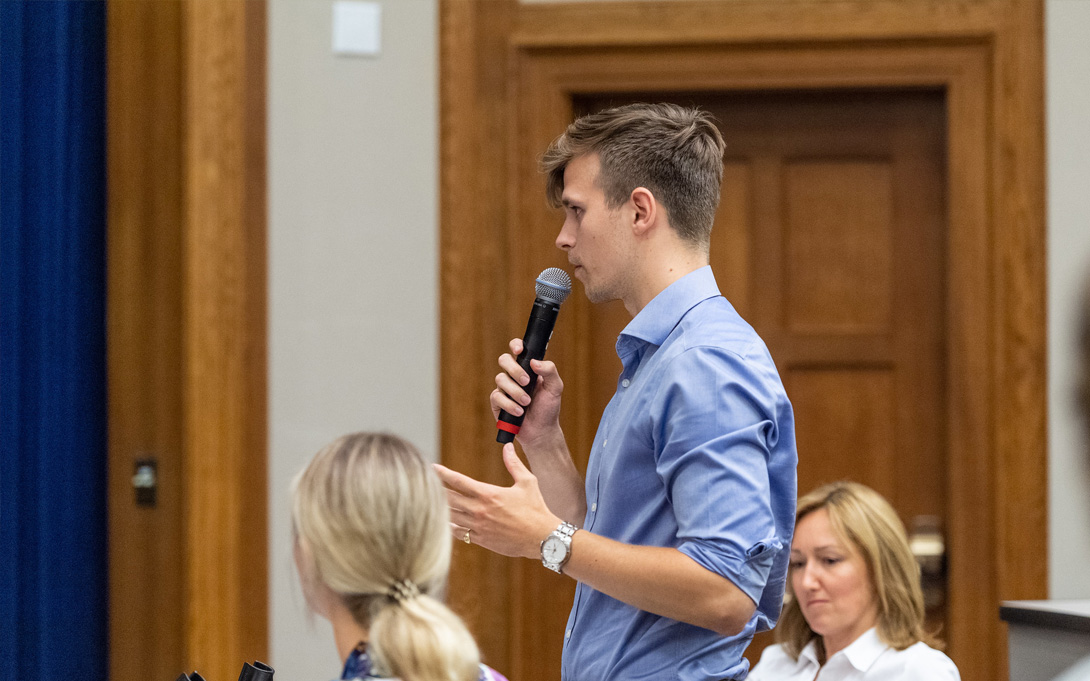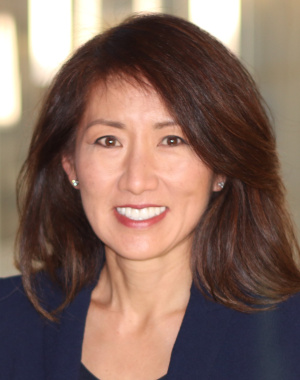
This semester, the Ford School is offering a new course designed to help future public policy professionals master verbal communication skills. It’s led by new lecturer Soojin Kwon, who brings three decades of experience in developing leaders and helping them effectively engage, influence, and inspire others. Early in her career, Kwon recognized that writing alone wasn’t sufficient for effective communication. During her time as a Presidential Management Fellow on Capitol Hill, Kwon coupled her training in writing a compelling policy brief with the ability to succinctly articulate key points and present them clearly and persuasively.
Read on for a Q&A with Kwon about the new course and how verbal communication skills can help influence policy.
What do you see as the greatest challenge for emerging leaders?
Kwon:
One of the biggest challenges for emerging leaders is understanding that the skills that earned them a promotion aren't enough to guarantee success in their new leadership role.
As leaders, they'll encounter situations that demand more than technical skills—they'll need to inspire their teams, advocate for their ideas, and build strong relationships with stakeholders. These crucial moments rely on effective verbal communication, making courses like "Effective Verbal Communications" essential for their success.
What are the foundations for effective verbal communication for policy professionals?
Kwon:
The Three Cs
- Clarity: Policy issues are often complex, so it's vital to distill your message into clear, understandable terms that your audience can easily grasp..
- Conciseness: Policy professionals often work with time-pressed stakeholders. So delivering your message efficiently is crucial.
- Connection: To make your message resonate, you must connect with your audience by actively listening and showing understanding, whether you're speaking to constituents, colleagues, or donors. Building credibility and rapport is essential for influencing.
Students in my class will engage in role-play exercises that simulate real-life professional scenarios, including informing, persuading, and inspiring different audiences. These exercises help students practice and refine the skills they need to effectively advocate for themselves, their ideas, and their vision for the public good.
What are you looking forward to most in your course?
Kwon: So many things! First, I'm looking forward to teaching students who are passionate about making a difference in the world and are eager to develop their skills. There's nothing more rewarding than helping dedicated individuals become powerful communicators.
I’m also thrilled to share practical tools and frameworks that will boost their confidence and amplify the impact of their verbal communication. Seeing students grow into compelling, confident speakers who can inspire and influence others is incredibly fulfilling. This course is all about empowering them to be the leaders they aspire to be!
What would you say to somebody who is afraid of public speaking? Should they take your course, and what can they learn?
Kwon: I get it—I was that person too! Back in school, just the thought of speaking in class made my heart race and my palms sweat. Giving presentations was the last thing I wanted to do. I always imagined myself as the behind-the-scenes thinker, a chief of staff to a policy leader, rather than someone out in front.
But then, my first job after earning my MPP was as a budget and policy analyst. I thought I could focus on research, analysis, and writing recommendations. But even in that role, I had to be able to present my ideas verbally to busy leaders as we walked the halls of Capitol Hill.
As my career progressed, I realized that public speaking was a critical part of every job I had. I needed to present my ideas clearly in meetings with senior leaders and give informational and persuasive presentations to diverse audiences.
Honestly, I wasn't comfortable speaking in front of others at first. But the more I practiced and observed speakers I admired, the easier it became.
That's why practice is a cornerstone of my course. Each class session includes a speaking component, giving students plenty of opportunities to practice and receive feedback. Public speaking might feel daunting now, but with the right tools and plenty of practice, it will get easier, and you'll become a more confident and effective communicator.
What do you hope students will come away with after taking your course?
Kwon: I hope they’ll leave the course with more than tools and techniques for effective verbal communication. I hope they’ll gain more confidence, respect, and opportunities as a result of their improved communication skills, and ultimately, make a greater impact in the world.
What are the essential books or podcasts that all emerging leaders should read and why?
Kwon: This is a really hard one, because there are so many great books! I'll share a couple that have resonated with me:
- Mindset: The New Psychology of Success, by Carol Dweck. This book is essential for emerging leaders because it teaches the value of a growth mindset—viewing challenges and failures not as setbacks, but as opportunities to learn and grow. Everyone will face what feels like failure at some point, whether it’s a minor setback or something that feels huge. Adopting a growth mindset fosters resilience, encourages continuous learning, and helps you turn obstacles into stepping stones for success.
- HBR on Leadership podcast. While it’s produced by Harvard Business Review, it covers universal leadership topics like strategic thinking, team management, decision-making, and innovation. It offers valuable insights and practical advice from top experts and thought leaders, making it a great resource for anyone looking to strengthen their leadership skills.
Regardless of where your policy degree takes you—whether it's government, an NGO, a nonprofit, higher education, or the private sector—you'll find yourself communicating with a wide range of people, both within and outside your organization. This is public speaking. Mastering this skill is not just beneficial; it’s essential for making a meaningful impact.
About Soojin Kwon
Kwon is the founder of Talent Peak Advisors, a leadership development firm dedicated to helping emerging and established leaders to effectively engage, influence and inspire others. She specializes in enhancing public speaking, executive presence, and storytelling skills through tailored workshops and personal coaching. Previously,
Kwon held people development and consulting roles at McKinsey and Deloitte. She also led the MBA Program and Admissions at Michigan Ross for nearly two decades and served as a lecturer in Business Communication.
Kwon holds an MBA from Ross, an MPP from Harvard Kennedy School and a BA in Economics and Political Science from Yale. A Michigan native, she returned to the state to attend Ross, and has remained here ever since, even sending her two sons to the University of Michigan.

